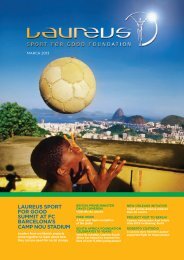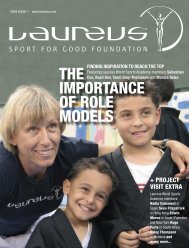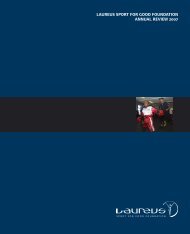Report: Sport Scores - Ecorys UK
Report: Sport Scores - Ecorys UK
Report: Sport Scores - Ecorys UK
You also want an ePaper? Increase the reach of your titles
YUMPU automatically turns print PDFs into web optimized ePapers that Google loves.
32<br />
<strong>Sport</strong> ScoreS: the costs and benefits of sport for crime reduction<br />
concLusions and Lessons<br />
33<br />
The Social legacy plans of mega sporting<br />
events can and should become increasingly<br />
ambitious – setting targets not just for<br />
participation but for the measured social and<br />
economic outcomes that (as shown in this<br />
report) sport can and does attain.<br />
LAuREuS AMBASSADOR VItALI KLItSCHKO WItH pARtICIpANtS FROM tHE KICK IM BOxRING pROJECt IN GERMANy<br />
recommeNDatioNS<br />
SPORT PROjEcTS PROvIdE<br />
ExcELLEnT vALUE fOR MOnEy.<br />
Through applying techniques of cost<br />
benefit analysis to the results of the<br />
impact research, the findings from three<br />
Laureus projects suggest that attractive,<br />
structured and facilitated sports<br />
activities can generate, on average,<br />
around 5 pounds in social benefit for<br />
every pound invested. Part of this is<br />
related to the cost-efficiency of sports<br />
projects; sport offers an opportunity for<br />
the engagement of both small groups<br />
of significantly disadvantaged children<br />
as well as large groups of mixed ability<br />
young people at a relatively low cost,<br />
as well as proving effective in delivering<br />
positive outcomes.<br />
nEET IMPAcTS PROvIdE A<br />
SIGnIfIcAnT RETURn On<br />
InvESTMEnT. Whilst many sports<br />
projects are focused on crime reduction,<br />
building in associated objectives around<br />
helping young people aged 16 years<br />
and over back into further education,<br />
training or employment can help to<br />
maximise their return on investment.<br />
This is because of the particularly high<br />
lifetime costs associated with being<br />
NEET. The two objectives however are<br />
complementary; reductions in NEET<br />
(as well as school exclusions) help<br />
to reduce the risk factors associated<br />
with offending and re-offending in the<br />
longer-term.<br />
SPORT WORKS THROUGH<br />
MULTIPLE MEcHAnISMS. This study<br />
has confirmed that sports projects are<br />
most effective when embedded within a<br />
complementary programme of support<br />
for personal development, underpinned<br />
by skilled youth work. However we<br />
would suggest that it is the combination<br />
of this with the positive values that<br />
sporting activity itself can help to instil,<br />
as well as the hook and wider appeal<br />
which sport provides for many of the<br />
hardest to reach young people, which<br />
results in sport being such a potent tool<br />
for tackling social exclusion.<br />
GOvERnMEnTS, fUndERS And<br />
UnIvERSITIES nEEd TO cOnTInUE<br />
InvESTInG In ROBUST RESEARcH<br />
InTO THE SOcIAL And EcOnOMIc<br />
RETURnS Of SPORT – with a view to<br />
deepening our collective understanding<br />
of what good practice looks like in this<br />
space, and how exactly sport can best<br />
be used to achieve value for society. As<br />
a minimum, this should involve primary<br />
research with project participants,<br />
and where possible take a longitudinal<br />
approach and employ use of suitable<br />
control groups to help assess impact.<br />
PUBLIc POLIcy MAKERS SHOULd<br />
AdOPT A ‘PAn-ISSUE And PAndEPARTMEnTAL’<br />
APPROAcH TO<br />
SPORT, that takes account of the broad<br />
and inter-linked returns that sport can<br />
generate across multiple social and<br />
economic areas.<br />
THE SOcIAL LEGAcy PLAnS Of<br />
MEGA SPORTInG EvEnTS cAn And<br />
SHOULd BEcOME IncREASInGLy<br />
AMBITIOUS – setting targets not just<br />
for participation but for the measured<br />
social and economic outcomes that<br />
(as shown in this report) sport can and<br />
does attain.<br />
f U ndERS Of SPORTS BASEd<br />
cOMMUnITy PROGRAMMES<br />
SHOULd InvEST nOT jUST In<br />
PROjEcT dELIvERy BUT In<br />
SySTEMS And PROcESSES THAT<br />
EnABLE PROGRAMMES TO cOLLEcT<br />
SOcIAL IMPAcT dATA – and track<br />
their impact over time. Going forward<br />
this will help ensure that the ‘sport for<br />
social change’ field continues to deepen<br />
its collective knowledge base, while<br />
making externally led research easier<br />
and more cost effective to conduct.<br />
www.laureus.com/foundation<br />
www.laureus.com/foundation








